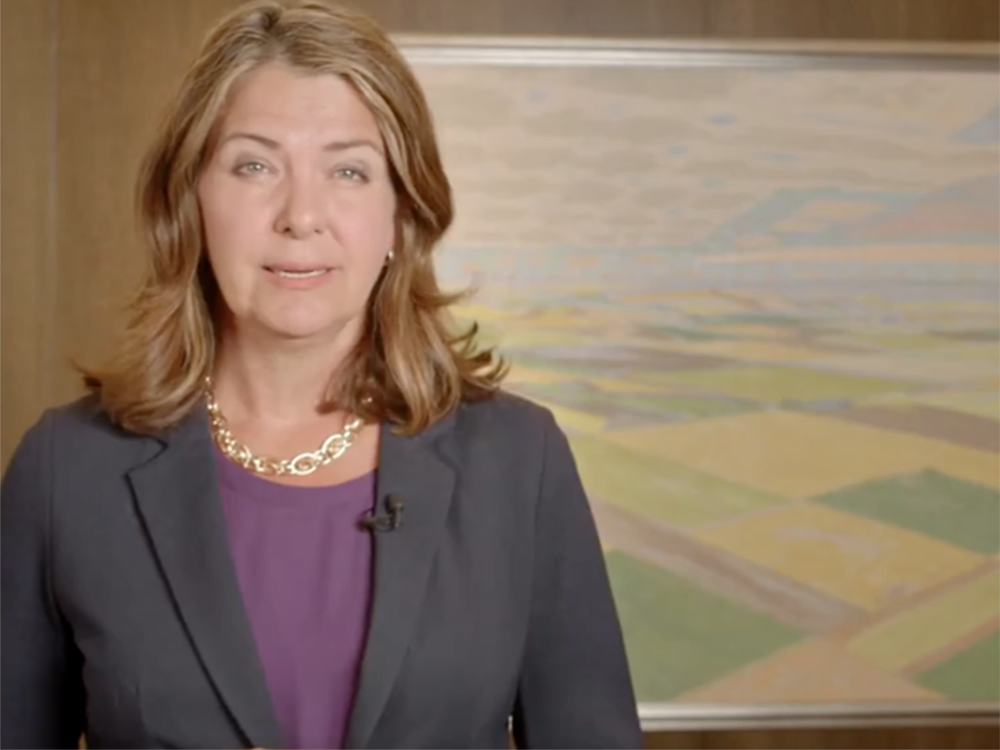
Danielle Smith said Alberta is also creating biological female-only sports leagues and will require parental consent to change pronouns or attend sexual education in schools
The pronoun policy announcement, which was hinted at in a radio broadcast last weekend, is likely to ignite debate in Alberta, as it did in Saskatchewan and New Brunswick.
Smith announced government policies after resolutions on gender and sexuality were brought forward by the United Conservative Party caucus at its annual general meeting last November.
“As premier of this province, I want every Albertan that identifies as transgender to know I care deeply about you and accept you as you are. As long as I lead this province, I will ensure you are supported and your rights are protected,” Smith said in the video.
The premier is set to take questions about the policies from reporters on Thursday. Here’s what we know so far.
What did Smith announce regarding transgender treatments?
Alberta will ban all top and bottom surgeries for those under the age of 18.
In the video, Smith said that “deciding whether or not to alter one’s biological sex” is one of many “adult choices” such as using legal drugs, their sexual activities or preferences.
“Making permanent and irreversible decisions regarding one’s biological sex while still a youth can severely limit that child’s choices in the future. Prematurely encouraging or enabling children to alter their very biology or natural growth, no matter how well intentioned and sincere, poses a risk to that child’s future that I, as premier, I’m not comfortable with permitting in our province,” Smith said.
Furthermore, Alberta will ban puberty blockers and hormone therapy for youths under the age of 16, with an exception for those who are already undergoing treatment.
Those aged 16 and 17 can begin hormone treatments, so long as they have approval from their parents, doctor and psychologist.
What’s the new policy for transgender pronouns in schools?
The rules will be more strict in Alberta.
For those aged 15 and under, parents will be notified and will be required to give consent to their child’s new name or pronoun.
For those aged 16 or 17, parents will be notified but will not be required to give consent.
“We know that nearly all parents, even those who may disagree with the decision of their children, will love and care for their children no matter what choices they make,” Smith said.
One of the major objections to such rules is that they may “out” children who are comfortable expressing their identity at school but may feel unsafe at home. In Saskatchewan, the Court of King’s Bench issued a temporary injunction against the school policy, saying it may cause “irreparable harm” to students.
In response, Premier Scott Moe’s conservative government invoked the notwithstanding clause, a constitutional tool that allows provincial governments to continue with policies even if they’re found to violate rights.
What about sex ed?
Sexual education, or any formal discussion of human sexuality or gender identity, will also be limited under the new policy measures.
Schools will need to notify parents, and receive an opt-in requirement, every single time there is a formal lesson on human sexuality, gender identity or sexual orientation. .
Smith also said that the education ministry will review all instructional materials used on these subjects in classrooms.
What about transgender people and sports?
Smith said there is an “emerging issue of the unfair disadvantages that young women and girls are experiencing when competing with biologically stronger transgender female athletes and sporting competitions.”
Smith called it “divisive and sometimes dangerous.”
As a result, the government will explore female-only sports leagues, with the possibility of transgender youth getting to participate in co-ed leagues.
Why are these policies coming now?
The new government policies come in the wake of resolutions brought forward by the United Conservative Party caucus at its annual general meeting last November.
The UCP’s new policy handbook commits to these three policies, in addition to others:
Reinstating “parental opt-in consent for any subjects of a religious or sexual nature, including enrolment in extracurricular activities/clubs or distribution of any instructional materials/resources related to these topic.”
“Support a comprehensive Bill of Parental Rights which ensures that all legislation will recognize and support parents’ rights to be informed of and in charge of all decisions to do with all services paid for by the province, including education and health care.”
It does not seem to mention anything about surgery or hormone treatment for minors, however. None of the policy resolutions specifically mentioned medical treatment for transgender youth.



